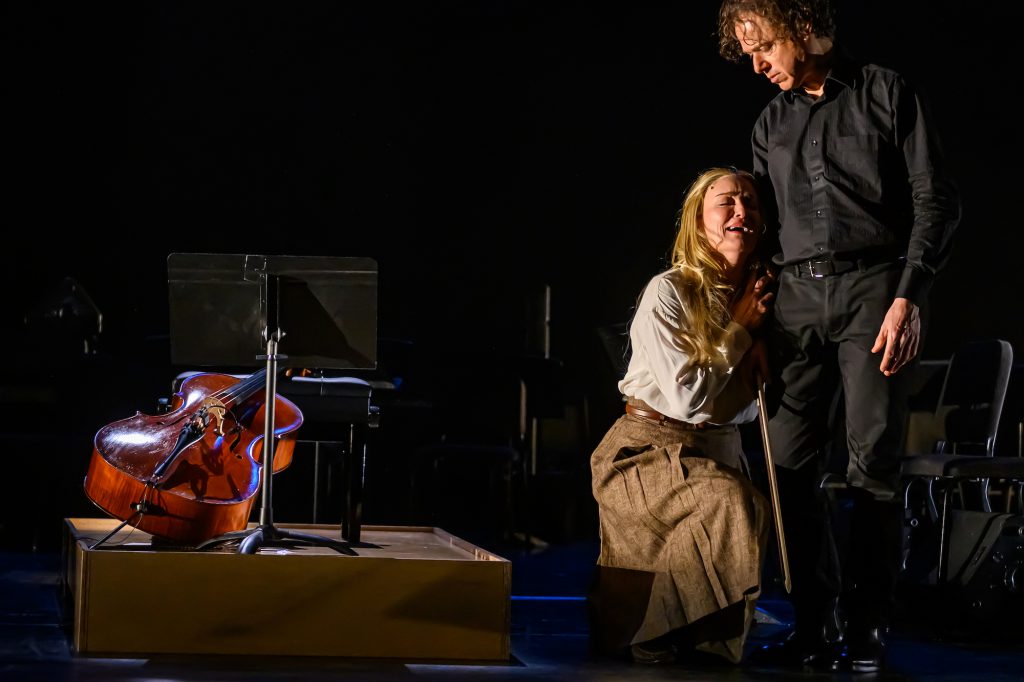Jacqueline du Pré, legendary golden-haired young cellist, unrivalled heir apparent to Casals and Rostropovich, inhabited a life transformed by multiple narrators after her death in 1987 into an almost mythical saga. A relentless surge of rumours and anecdotes still swirls around her memory. Stories of locked practice rooms from childhood. Of utter nervelessness as a fearless teenage prodigy on show at the Royal Festival Hall. Of her alleged feverish affair with sister Hilary’s husband. Of her willing surrender to her own husband, conductor Daniel Barenboim’s taxing, single-minded plans for her spectacular latter day career.
Almost five decades after forced to abandon the world of performance, a cruel, agonizing decision imposed by the relentless progress of Multiple Sclerosis shockingly diagnosed at the age of twenty-eight, fascination with Du Pré’s legacy has continued to peak with each passing decade. Two books, one by Hilary and brother Piers later adapted to film, the still controversial biopic, Hilary and Jackie; a West End play, Duet for One; plus a new upcoming ballet, The Cellist, currently in development by London’s Royal Ballet, have, if not spawned, then certainly solidified Jacqueline du Pré’s status as an enduring 20th century classical icon. Her music and spirit live on both in recordings and streaming video, her playing a passionate denial of all that is mortal and evanescent, her presence dazzlingly resurrected on the World Wide Web.
And now comes an opera, a brilliant, wrenching chamber work by Montreal-based composer Luna Pearl Woolf, libretto by Alberta-born Brooklynite Royce Vavrek. World premiered by Toronto’s Tapestry Opera last Wednesday at the intimate Betty Oliphant Theatre, director/dramaturge Michael Hidetoshi Mori flings us headfirst body and soul into the centre of towering virtuosity and pain that was and always will be du Pré.
Presented as a series of compact black-out scenes witnessed in four discrete “movements”, a writerly nod, albeit oblique, to a du Pré signature piece, Elgar’s Cello Concerto, Op. 85, Jacqueline electrifies, showcasing a series of vibrant sketches witnessed in contrasting shades of sorrow and joy. If formal story structure is allowed to slip inevitably in and out of the spotlight here, high drama never occupies anything less than centre stage.
Movement I: Flashing backwards in time and place Jacqueline, still optimistic despite the onset of a mysterious debilitating medical condition, recalls a more carefree time in her life. The appearance of her first cello. Her crisp declaration to a disapproving producer at an early recording session — “I will play as I feel. I will take all the liberties. This will be the du Pré edition.” Her first encounter with Daniel. “We consummated our love by playing Brahms.” Her conversion to Judaism and marriage at Jerusalem’s sacred Western Wall.
Movement II: Gathering apprehension. Alarmed by a preliminary assessment of her illness as psychologically induced, du Pré buries herself in her frantic schedule, a dizzying round of concert tours and cocktail parties. “With the cello I am Samson,” she exalts. “No mortal can best me.” A disastrous performance rekindles worry.
Movement III: A telephone call to Jacqueline’s mother. Feelings of loneliness and abandonment overwhelm. Her cello, repeatedly referenced as inseperable creative partner in preceding scenes, assumes an even more urgent presence in her life. “I have a disease,” she confesses to Mon ami, “to which you reply. ‘I know.’” Medical sentence is pronounced. Memory of childhood yields no escape. Running through a field of wildflowers with Hilary. The bitter reality of a recent fall. MS robs her of hope. Rage and terror engulf her.
Movement IV: The cello grieves. Jacqueline struggles to survive. A record player descends from above. An LP begins to spin. The Elgar concerto is heard. The Cello plays on. Sudden darkness silences the final note.
Soprano Marnie Breckenridge as Jacqueline tears at the heart, contributing a sweeping portrayal of the obsessed, supremely gifted du Pré, deeply disturbing in scenes of suffering, playful and flippant in moments of repose. Singing with great purity and directness, Breckenridge enthralls, brittle and silvery, bitter and humane. “I am the hussy straddling the Strad,” her character exalts. “Wild and ferocious.” The truth, as revealed in this fine, affecting performance is as rich and resonant as du Pré herself inevitably revealed on stage.
Cellist Matt Haimovitz inhabits Mon ami personifying du Pré’s cherished instrument with great command, instantly absorbing our attention. This is a conceit of immense force and originality and Haimovitz invests it with an endless abundance of presence, a masterclass in method, animated yet inanimate, his voice, The Cello’s voice, vibrating with expression. Woolf’s music, heavily reliant on complex chord progressions and laser-sharp shifts of rhythm and tonality, sits well with Haimovitz’s relentless attack and palpable physicality. To see and hear him calmly blazing his way through the composer’s blistering, harmonically superheated score, bow flashing, fingers flying up and down his cello’s neckpiece is to witness nothing less than sheer genius at work. His extended Act IV solos, a lengthy fitful intermezzo by Woolf filled with tears and grief and the Elgar, written at the end of World War I, a reaching out for healing, are delivered with an inexpressible depth of feeling and humanity.
Jacqueline is a profoundly moving opera, one that shreds the emotions, glowingly performed with strong, highly polished production values. The set by designer Camellia Koo is as simple as it is poignant, a shattered concert hall, empty chairs and scattered music stands flung into the air, suspended in limbo, frozen in time.
A 40th anniversary offering, this powerful, supremely resourceful Tapestry Opera production lingers long in memory. Jacqueline du Pré is masterfully well served.


